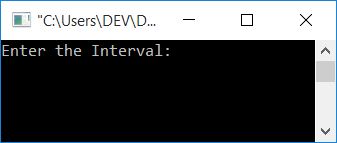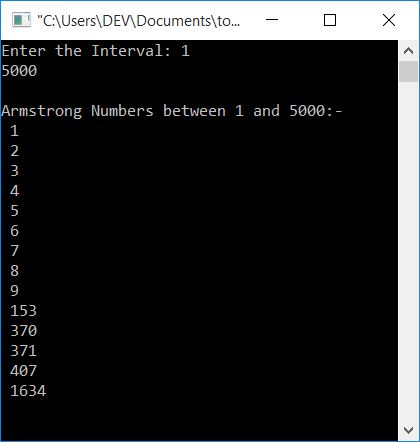- C Programming Examples
- C Programming Examples
- C Print Hello World
- C Get Input from User
- C Print Integer
- C Add Two Numbers
- C Add Subtract Multiply Divide
- C Add n Numbers
- C Area Perimeter of Square
- C Area Perimeter of Rectangle
- C Area Circum of Circle
- C Fahrenheit to Celsius
- C Celsius to Fahrenheit
- C Inches to Centimeters
- C Kilogram to Gram
- C Reverse a Number
- C Swap Two Numbers
- C Interchange Numbers
- C Print ASCII Value
- C Print Fibonacci Series
- C Check Palindrome or Not
- C Check Armstrong or Not
- C Find Armstrong Numbers
- C Find nCr and nPr
- C Find Profit Loss
- C Sum of their Square
- C First & Last Digit Sum
- C Sum of All Digit
- C Product of All Digit
- C Print Total Digit in Number
- C Check Perfect Number
- C Find Basic Gross Salary
- C Round Number to Integer
- C Print Series upto n Term
- C Find Factors of Number
- C if-else & Loop Programs
- C Check Even or Odd
- C Check Prime or Not
- C Check Alphabet or Not
- C Check Vowel or Not
- C Check Leap Year or Not
- C Is Reverse Equal Original
- C Make Calculator
- C Add Digits of Number
- Count Positive Negative Zero
- C Largest of Two Numbers
- C Largest of Three Numbers
- C Smallest of Two Numbers
- C Smallest of Three Numbers
- C Find Factorial of Number
- C Find LCM & HCF
- C Find LCM of n Numbers
- C Find HCF of n Numbers
- C Find Arithmetic Mean
- C Find Average, Percentage
- C Find Student Grade
- C Print Table of Number
- C Print Prime Numbers
- C Find Discount Purchase
- C Calculate Parcel Charge
- C Calculate Wage of Labor
- C Print Phone Bill
- C Conversion programs
- C Decimal to Binary
- C Decimal to Octal
- C Decimal to Hexadecimal
- C Binary to Decimal
- C Binary to Octal
- C Binary to Hexadecimal
- C Octal to Decimal
- C Octal to Binary
- C Octal to Hexadecimal
- C Hexadecimal to Decimal
- C Hexadecimal to Binary
- C Hexadecimal to Octal
- C Pattern Programs
- C Pattern Printing Programs
- C Print Diamond Pattern
- C Print Floyd's Triangle
- C Print Pascal's Triangle
- C Array Programs
- C 1D Array Programs
- C Linear Search
- C Binary Search
- C Largest Element in Array
- C Smallest Element in Array
- C Second Largest/Smallest
- C Count Even Odd
- C Array Element at Even
- C Array Element at Odd
- C Print Even Array Elements
- C Print Odd Array Elements
- C Sum/Product of Even/Odd
- C Reverse an Array
- C Insert Element in Array
- C Delete Element from Array
- C Merge Two Arrays
- C Bubble Sort
- C Selection Sort
- C Insertion Sort
- C Print Common Elements
- C 2D Array Programs
- C Add Two Matrices
- C Subtract Two Matrices
- C Transpose a Matrix
- C Multiply Two Matrices
- C Sum All Matrix Elements
- C Largest Element in Matrix
- C Print Row Column Total
- C 3D Array Programs
- C String Programs
- C Print String
- C Find Length of String
- C Compare Two String
- C Copy a String
- C Concatenate String
- C Reverse a String
- C Count Vowels Consonants
- C Replace Vowel in String
- C Delete Vowels from String
- C Delete Word from String
- C Frequency of Character
- C Count Word in String
- C Remove Spaces from String
- C Sort a String
- C Sort String in Alphabetical
- C Sort Words in Ascending
- C Sort Words in Descending
- C Uppercase to Lowercase
- C Lowercase to Uppercase
- C Swap Two Strings
- C Check Anagram or Not
- C Check Palindrome String
- C Print Number in Words
- C Print Successive Character
- C Character without Space
- C File Programs
- C Read a File
- C Write Content to File
- C Read & Display File
- C Copy a File
- C Merge Two Files
- C Reverse File
- C Count All Character in File
- C List Files in Directory
- C Encrypt & Decrypt a File
- C Delete a File
- C Misc Programs
- Generate Random Numbers
- C Print Date Time
- C Print Message with Time
- C Get IP Address
- C Print Smiling face
- C Pass Array to Function
- Add Two Numbers using Pointer
- C Address of Variable
- C Shutdown Computer
- C Programming Tutorial
- C Tutorial
C Program to Generate Armstrong Numbers
In this article, you will learn and get code to print Armstrong numbers in a given range with and without using a user-defined function. But before going through the program, let's first understand it.
What is the Armstrong number?
An Armstrong number is a number that equals the sum of its own digits, where each digit is raised to the power of the number of digits. For example, 153 is an Armstrong number because:
153 = 13+53+33
= 1+125+27
= 153
Since 153 is a 3-digit number, each digit is raised to the power of 3. Now let's move on and implement it in a C program.
Generate Armstrong Numbers within the Given Range
This program prints all the Armstrong numbers that lie within the range provided by the user at run-time.
#include<stdio.h> #include<conio.h> int main() { int start, end, temp, noOfDigit, num, res=0, rem, pow, i; printf("Enter the Interval: "); scanf("%d%d", &start, &end); printf("\nArmstrong Numbers between %d and %d:-\n", start, end); while(start<=end) { temp = start; noOfDigit=0; while(temp>0) { temp = temp/10; noOfDigit++; } num = start; while(num>0) { rem = num%10; pow = 1; i = 0; while(i<noOfDigit) { pow = pow*rem; i++; } res = res + pow; num = num/10; } if(res==start) printf(" %d\n", res); start++; res = 0; } getch(); return 0; }
This program was built and runs under the Code::Blocks IDE. Here is its sample run:

Now supply two numbers as intervals, say 1 and 5000, to print all the Armstrong numbers between these two. That is, the snapshot given below shows all the Armstrong numbers from 1 to 5000:

Note: Every single-digit number is an Armstrong number. Since it is a 1-digit, therefore, the power raised to it will be 1 (as defined in the definition given above), and any number raised to the power of 1 is equal to the number itself.
Therefore, 1, 2, 3, 4, 5, 6, 7, 8, 9, 153, 370, 371, 407, and 1634 are Armstrong numbers between 1 and 5000. Because,
- 1 = 11 (digit to the power of 1, for 1-digit number)
- 2 = 21
- 3 = 31
- 4 = 41
- 5 = 51
- 6 = 61
- 7 = 71
- 8 = 81
- 9 = 91
- 153 = 13+53+33 (digit to the power of 3, for 3-digit number)
- 370 = 33+73+03
- 371 = 33+73+13
- 407 = 43+03+73
- 1634 = 14+64+34+44 (digit to the power of 4, for 4-digit number)
The following block of code
temp = start;
noOfDigit=0;
while(temp>0)
{
temp = temp/10;
noOfDigit++;
}
is used to find the number of digits in the current number. That is, the value of the start variable gets initialized to temp, and using this variable, this block of code finds how many digits this number has.
Here is another block of code,
pow = 1;
i = 0;
while(i<noOfDigit)
{
pow = pow*rem;
i++;
}
which is used to find the digit raised to the power's value. For example, if the current digit is 3 and the number is a 3-digit number, then this block of code will find the value of 33. Now let's create the same-purpose program using a user-defined function.
Generate Armstrong numbers using a user-defined function
This program is easy to understand as it was created using user-defined functions. That is, the two blocks of codes that were required to run more than once are shifted in the function, and the names of those two functions are findNoOfDigit(int) (finds number of digits) and pow(int rem, int noOfDigit) (finds digit raised to power's value). Finding the number of digits means that if a number is 370, it will therefore return 3. because it is a 3-digit number. Finding a digit raised to the power's value means that if a digit is 3 (from a 3-digit number), then 33 equals 27, so function returns 27.
#include<stdio.h> #include<conio.h> int findNoOfDigit(int); int pow(int, int); void generateArmNos(int, int); int main() { int start, end; printf("Enter the Interval: "); scanf("%d%d", &start, &end); printf("\nArmstrong Numbers between %d and %d:-\n", start, end); generateArmNos(start, end); getch(); return 0; } void generateArmNos(int start, int end) { int noOfDigit, num, digToPowVal, i, rem, res=0; while(start<=end) { noOfDigit = findNoOfDigit(start); num = start; while(num>0) { rem = num%10; digToPowVal = pow(rem, noOfDigit); res = res+digToPowVal; num = num/10; } if(res==start) printf(" %d\n", res); start++; res = 0; } } int findNoOfDigit(int temp) { int noOfDigit=0; while(temp>0) { temp = temp/10; noOfDigit++; } return noOfDigit; } int pow(int rem, int noOfDigit) { int digToPowVal = 1, i=0; while(i<noOfDigit) { digToPowVal = digToPowVal*rem; i++; } return digToPowVal; }
This program produced the same output as the previous one.
The same program in different languages
« Previous Program Next Program »